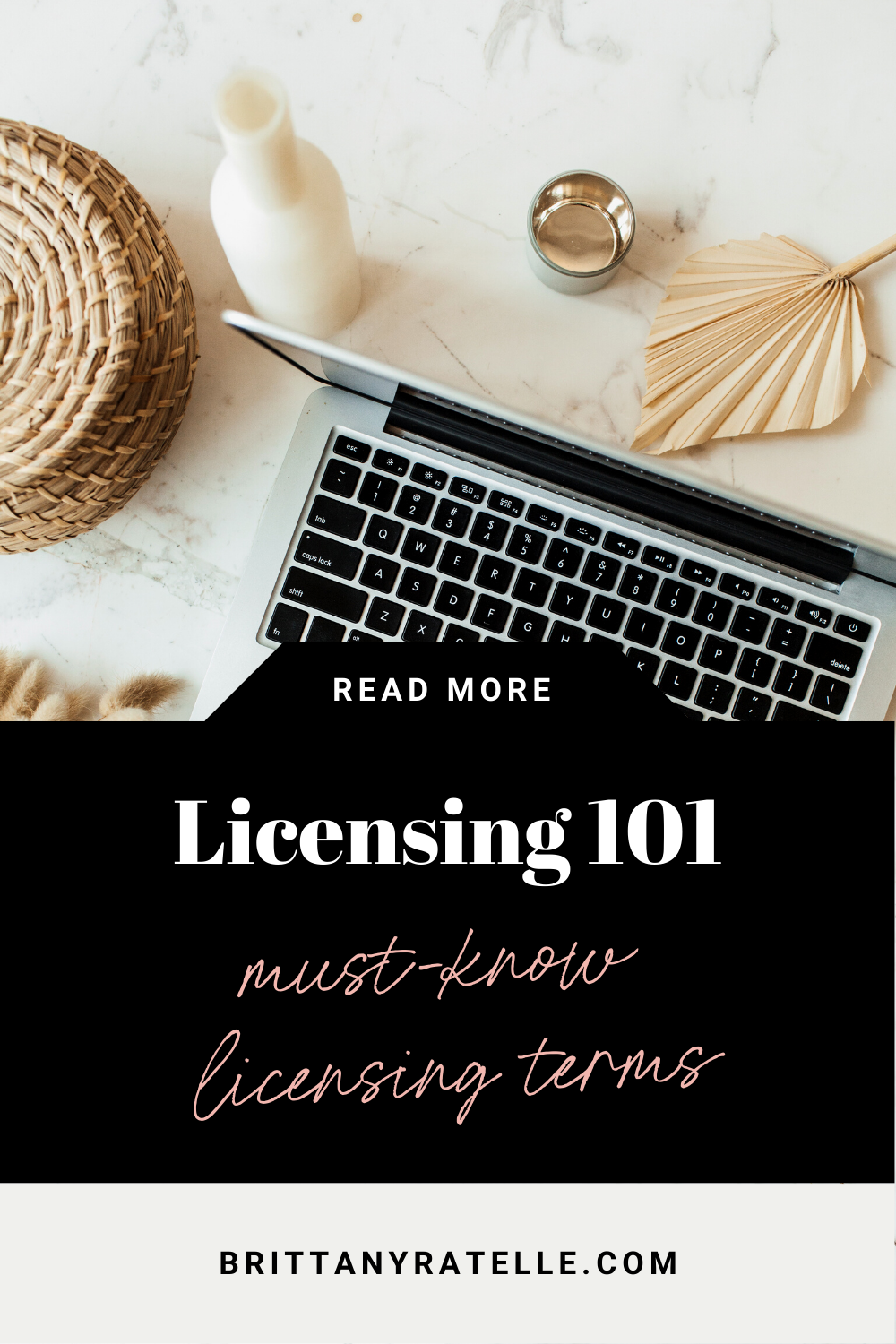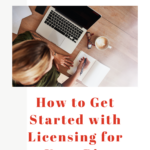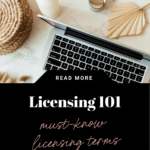I’m Brittany Ratelle, attorney for online business owners. I’m so excited to have you here. I help business owners just like you get legally legit so they can show up and own their business in every sense of the word. We’re going to talk about the world of licensing. Welcome to Licensing 101 – must-know licensing terms. We’ll go over what you need to know as a modern business owner to make sure that you are protecting, investing, and harvesting all the amazing money and revenue opportunities that are part of the brand and the content you’ve created.
Watch the video HERE.
This is part of a foundational series that we’ve been doing about getting your business legally legit and getting your foundation, people, brand and products set up. Licensing actually stretches across a few of these categories. We’re talking about how you deal with other people and share what’s great and amazing about your brand. We’ll also go over the must-know licensing terms that may seem confusing at first.
You don’t want to keep all of the good things that you’ve built about your brand to yourself. This can include the brand name, product, artwork, and even your audience or community. You also want to put good boundaries around that relationship so that you can continue to show up and serve. You can expand your revenue and generate opportunities beyond what you can immediately do on your own. This is about harnessing the power of people and community as well as co-branded and joint ventures in a really smart and savvy way.
Disclaimer
Disclaimer: What kind of attorney would I be without a disclaimer? While I am an intellectual property and business attorney licensed in Idaho and Utah, I’m not your attorney. This is not an attorney-client relationship. If you have any questions about what you hear today or any of my resources and content, make sure you reach out to an attorney in your jurisdiction.
Licensing 101 – must-know licensing terms
Licensing is a very broad term in intellectual property law that talks about the business of divvying up and dividing the rights that someone gets when they create something.
Now they want to sell some of those rights to other people under a lot of very specific circumstances. When you create a work (meaning you make a product, write, or record something) you are the creator and you have baked a creative cake.
When you create it, you own all the slices automatically. There are some benefits to registering the rights to your cake. That’s called copyright registration. I talk a little bit about this in my other video about intellectual property tools. You’ll learn the basics of what is copyright vs. trademark. How can I use it to protect my business?
Your Creative Cake
How can I make money with my cake, Britt? That answer is licensing. You are going to look at your cake with all of these slices. You’ll think, “I created this cool work, and I am going to sell you this slice.” This means that someone else gets the rights to use this work, put it on t-shirts, and sell them in the U.S. That is called licensing that scheme. This can increase and exponentially elevate the opportunities that you have.
While you might not be an expert in creating, producing, fulfilling, and shipping t-shirts, someone else might be. In fact, they might have a really great system for it. Licensing allows you to partner with that person to work together. You can license your work to this other person so that you can make money, be happy, and solve people’s problems.
Licensing Contract
The most important agreement is the licensing contract or the licensing agreement. This is usually a thick contract that is going to outline and put strong language around the relationship that you’re going to have with your licensing partners.
There are a few terms that you need to be paying attention to. These are important If you are handed a licensing agreement, if you are drafting a licensing agreement, or even if we’re not into contract territory yet. If you are just starting the discussion about putting together a licensing relationship with somebody, you should still be on the lookout for these terms. We need to understand what is going to be the give-and-take relationship, and what are going to be the asks, promises, and deliverables of a good licensing relationship.
Agreements for Specific Industries
Licensing agreements come in all shapes and sizes. And there are some specific ones that you’re probably familiar with in your industry. If you are an author, you probably know about license agreements or publishing agreements. If you are an influencer, you’ve probably seen influencer collaboration or sponsored content agreements. Those are forms of licensing agreements.
If you’re an influencer or on the merchandise and physical product side, it’s likely that you’ve seen things called collaboration agreements, joint marketing agreements, or co-branded products. There’s no standard nomenclature of what to call them. So sometimes attorneys like to flex their creative powers in really weird ways. Just like people in Utah, when they name their children. I can say that because I had all my children in Utah.
It means people are using their creativity in weird ways. We’re not really sure what to expect of them or if these agreements are all talking about the same thing (and they are). If you see a licensing agreement or you see some of these terms going on, and we’re talking about intellectual property and parceling out rights, that’s licensing.
Term
The first thing you want to pay attention to is the term or length of the agreement. A licensing agreement is like a business marriage. How long do we expect this marriage to last? You want to know how long, because you are committing to and locked into this partner. In most licensing agreements, a term is normally 1-4 years. I have seen longer, but I don’t recommend a longer agreement.
If a contract is longer than that, you may not be accounting for inflation or a huge change of circumstances. Meaning one party could get way more popular and should have a higher rate. And yet they’re locked in at this rate. Less than a year is usually pretty rare, unless this is something that has a really quick turnaround time, like a digital product.
For a physical product, it’s usually going to take longer than that to source, create the packaging, and get the distribution channels and fulfillment worked out. It’s normal for people to be locked in for a little. They want to make sure they’re not outlaying all of that investment in capital and then you’re going to run away and not deliver on your end of the deal.
Renewals
Make sure you know what the term of your licensing agreement is, and know how your licensing agreement renews. A lot of licensing agreements are set up to auto-renew. They may say that the agreement will renew unless the parties come together and negotiate with 30, 60, or 90-day notice.
If you are the creator and you have a licensing partner, and the deal is going okay, you still may want to renegotiate because you’re in a different position of power. (This would be a great time to call an attorney, by the way.) If the renewal date is coming up, make sure you have it on your calendar. Add in a few weeks before the contract renews to make sure that your partner is aware. Don’t assume someone else will remind you. If the contract is working for them, they may not bring it up.
Royalties
Everyone cares about the money in the contract.
Royalties are normally how people pay out on licensing contracts. Royalty means that you get a percentage of how much you sell. It’s a really fair way of distributing risk. Neither of us knows how much money we’re going to make. So we’re going to split and give you a percentage based on how much money we make.
Licensing rates can vary. People want to know an exact number, but it really depends on the cost of the product, and how much your creative work is the one that’s selling the product. A company like Disney can command physical product licensing rates of 10-15%. Most companies don’t have the name power of Disney and their rates will be lower.
Don’t be offended if your licensing agreement rate is 5-7%. That’s probably going to be on gross revenue. Make sure you understand how often royalties are paid. Quarterly is pretty normal, but it could be monthly. It could also be twice a year or yearly (but I wouldn’t recommend that). Be aware of how they calculate it. Is a royalty rate going to be based on gross revenue (meaning the actual price)? If it’s a $10 product, that would be the gross revenue. Or is it calculated on the profit? Note: if it’s on the net profit, the person who’s selling will have better control over that.
If the royalty rate is based on net profit, you may not have as much control. I’m not saying that someone could rip you off or is padding the expenses. But, you might not have as much control over the shipping costs, fulfillment, and other factors that could be affecting your profit share. Those can quickly eat up some of your profits in a way that impacts you more than it does your other partner.
Royalties can also come in tiers. This is more common in industries like book publishing, film production, or entertainment. The rate is based on a certain volume. If you sell more, we’re in a different royalty tier.
Audit Rights
Also check for audit rights. Is there a right for you to look at the books and audit your other partner? You’re relying on them to be honest, and you might not have access to the dashboard to view how many sales are coming in. You assume that they’re doing a good job with their bookkeeping.
If you have any doubt whether you’re being paid correctly, check for an audit right in your contract. Exercise that if you need to. Most of those audit rights will say “on a reasonable basis” or “once a year” or that you have to pay for it, unless they find something. If the auditor finds that there’s something not right, then the other side has to pay for it. This makes sense, because they need to fix their mistake.
Exchange Rates/Inflation
Check for exchange rates and inflation, especially if you’re dealing with international partners. You want to be really clear about whether this is American dollars, Australian dollars, or Canadian dollars. You also need to lay out how you’re being paid and the manner (i.e. physical check, electronic payment, etc.).
If it’s a check, make sure that’s an address box that you have control over. Double-check the account numbers on any electronic payments or wire transfers.
Quality Assurance
Check for quality assurance. Make sure you have a right to look at the samples beforehand. Do you have any rights to check the marketing or the use of your name, image, and likeness before it’s released? Depending on what the asks are in the relationship, make sure that you are getting the rights that you need to control.
We want people to have a really consistent and good relationship with your brand. If you’re partnering with someone, they shouldn’t be putting out really cheap merchandise that’s going to have a bad customer experience with your audience. It’s going to reflect back poorly on you, whether or not you approved it.
The “Work”
The “work” is the thing that you’re licensing. This could be the surface pattern design, audio, online course, book, ebook, or video that you created. First of all, we need to make sure that you have protected all the rights to it.
The licensing agreement may refer to reps and warranties, which means these are promises you’re making to the other side. You’re telling them that the work you created is original. You have written agreements to show that, or you got it properly licensed. You are making a promise and standing behind it.
What can be problematic here is if that’s not true. Then you could be in breach of contract. If there are allegations down the line about who created this, you likely will have to indemnify and come to the aid in the litigation sense. You will have to pony up the time and money to defend your other licensing partner, because you promised that the stuff was original and it turns out it wasn’t.
Set Boundaries
Before you get into licensing, it’s a good idea to work with an intellectual property attorney (like me!) or a smart colleague. Make sure that you’ve taken a look at your work, brand, and content. Do your own homework and set out good boundaries around it. You should have either registered the copyright or trademark, or you have contracts in place that protect it. We want to protect the work to make sure that you’ve built this on solid ground, on real estate that you own.
That’s when you can then turn and wheel and deal that creator cake to other people. We don’t want to be selling cake slices with bad ingredients. Let’s make sure we own what we create so that we’re ready for all these awesome opportunities of licensing, royalties, and expansion projects.
Sometimes royalties don’t work out or they’re not practically feasible. If you’re a smaller business or brand and you’re working with another smaller business, royalty structures can be a lot to figure out. You need to have really good bookkeeping. Make sure people are keeping track of the SKUs, how many items sold, and what the costs were. You also need to have good balance sheets and forecasting.
Other Ways to Structure Licensing
If all of that seems overwhelming, you might not be ready for royalties yet. Another way that you can structure a licensing agreement is with a buyout, limited buyout, or a license of use. This means that you are going to allow someone to use your work for a limited amount of time. You will charge them a fee for it.
You could say, “You can use my artwork and put it in your fall collection for the next 6 months or a year.” You can customize this to your needs. Make sure you’re charging enough for your design fee and then also a good forecast of what profits you anticipate earning.
You can also structure payments. They may pay you a little bit now for your time and for setting up the agreement. Then they pay you a set fee every month. Or they pay you a certain amount within 30 days after launch. There are many different ways that you can set up a licensing agreement if royalties just don’t make a lot of practical sense for one or both sides.
Copyright and Trademark Come First
Remember that copyright or trademark always needs to come first.
Make sure that you have all the intellectual property rights. Put on that CEO hat and think about who contributed to the work. Did anyone else touch this work, create this work, or pour into this work? The way copyright law works here in the United States is that the person who created the work owns the rights, unless you have something in writing otherwise.
Get Everything in Writing
This may come up when you are dealing with photography or videography work because it’s possible that you did not do the photography or videography or recording of your work. That’s fine. Make sure that the people you hired have a written agreement (like a copyright assignment, work-for-hire agreement, or an independent contractor agreement). The work needs to be properly assigned and transferred to your business pot.
If it’s not in your business pot, then you can’t turn around and go license that to someone else. You would be lying if you said, “I can license this and you can pay me money for it.” But you don’t actually own it in the first place. This can get you in trouble down the road. Make sure you own your rights to that. You should have done a good audit and be working with a good IP attorney to make sure your house is in order. It should be ready to build on and add that addition.
Exclusivity
Next, we want to talk about exclusivity. It means what you think it does. I want to be exclusive. Think of this as like our DTR (define the relationship talk), to go back to our business marriage metaphor.
If you’re going to get business married to someone, you should have a talk at some point saying, “It’s my expectation that we will be exclusive.”
Exclusive could mean certain product categories. If you’re the creator, let’s say you have your cool artwork and you’re working with someone to produce socks. You want to have in your agreement that I am licensing this artwork exclusively for socks.
Be Specific
If you say clothing, then it means they could put it on any clothing (which maybe you want, maybe you don’t). What if the next day someone comes and they’re the hat guru? Now you want to make hats, but you promised the sock company that they could be exclusive for all clothing.
They might not even do hats, but you gave them exclusivity. And so now you’d have to go back and renegotiate. This is not ideal. We’re not in a great bargaining position. Make sure that you’re thinking about what makes sense for exclusivity, especially for that term.
Reversion of Rights
If you’re giving someone a big term, make sure that they can’t just sit on it. I was at a conference once and heard a horror story from an artist. She had signed a licensing agreement a few years ago. She had given someone locked-out exclusivity on a few of her bestselling designs. And they sat on it.
They did not release any products or put any marketing budget behind it. They didn’t advertise it, but they had exclusivity. There was nothing she could do because there wasn’t language in that contract to protect her. It should have said, “If you don’t launch something and sell this within X amount of time, the deal is off. I get the rights to my stuff back.”
We call that a reversion of rights. And it’s really important in a contract. If you think there’s any chance that this person might not sell that or they might put you on the back burner, make sure you have this wording in the contract. This artist received a tiny little payout in the beginning, but she should have been charging more and making a lot of money.
The last thing we want is for someone to be a toadstool on your creative work, because you haven’t protected your rights. So make sure that you are limiting the product categories. Don’t let them have exclusivity for everything unless they’re going to do a good job and it’s worth it.
Exclusivity by Territory
Exclusivity can also be limited to territory. You can give someone exclusive use for a state, country, or continent. This could include North America or English-speaking areas. If you’re getting into the publishing realm, they usually specify by the language or something like the European zone or Asia. They could even specify zones of economic commerce or the EU zone.
Make sure you understand what distribution they have and that you’re giving up the rights and money in this agreement. There should be a good balance on the other side.
Subsidiary Licensing
Subsidiary licensing comes up in a lot of entertainment contracts like publishing and movie agreements. It basically means that you’re giving them a slice of the cake you created. Then they can take that slice and cut it into even smaller slices. You may or may not want them to have that power. If you don’t, you need to make sure that there are no subsidiary licensing rights that are going to be granted to your partner on the other side. Watch for that in your contract.
Use
Next, let’s talk about use. This is especially important, depending on the format, manner, and exclusivity. So what can they do? What are the IP rights they are actually getting from you? What is in the slice that you are selling to this partner? Can they use it on specific products? Is it limited to certain media formats? Is it limited to a certain amount of people, impressions, or areas?
This can be very customized depending on the type of agreement and the type of property that’s being licensed. These are good questions that you should have, and that you should be talking about as you’re approaching negotiations and discussions with licensing partners.
Non-Disclosure Agreements (NDAs)
These next few terms are our boilerplate items that should be in just about any contract. First is a non-disclosure agreement or NDA. This means we want to make sure that we are both pulling back the curtain a little bit on our businesses.
We should be professional and respectful of our access to confidential and proprietary information that normally the public does not see. Some examples include pricing, editorial calendar, products, vendors, and launch strategies. These are all things that we want to protect. We want to make sure there’s good NDA confidentiality language, and that’s in the agreement.
Assignment
Assignment means that someone can assign and they can take their slice and then sell it to someone else. Sometimes assignments are allowed if someone sells their whole company to someone else. Watch for that. I like to add in when I’m redlining these agreements, you can do that with permission. You may want to sell your whole company and you get bought out and acquired by someone else.
Your partner would like a heads up and to be able to approve that because they trusted you. They may not want to do business with the new owner. They didn’t talk and didn’t have a relationship. You want to make sure that you have an out if you don’t like that new partner, or if circumstances have changed enough that the new deal is no good for you and you want a different deal.
Termination
Termination means, how can we kill the deal? Make sure you have language in there saying that if there’s a breach of contract, you can kill it. It could be a type of agreement where you can do a sample (like a trial period). That can give you an out in terms of termination. Be sure you understand, how can we kill this deal if we need to? How can I walk away? What’s the bottom line? Know that you’ve negotiated based on all the other risks and balls you have up in the air.
Indemnity
Indemnity is that weird legal doctrine stuff that lawyers worry about. Insurance lawyers worry a lot about this. It is literally all they do. Indemnity involves who is going to be coming to bat for someone if we have a third-party problem. If someone else sues us for something, we may be looking around thinking, “Is this your problem? Is this my problem?” Indemnity answers that. Make sure that we have clear indemnification provisions.
Sometimes we cross the whole agreement out. Sometimes we make it mutual. You might say, “You’re in charge of the things that you can control and come to bat for that. I’m going to back up the stuff that I can control.” Make sure we’re not shifting the opposite way.
Product Liability
Do not take on and then indemnify a company, especially if it’s a big company and they’re a big target. They could have a class action lawsuit and you could have no control over it. If they did shady stuff in their business and they took your artwork and put it on a crappy product that was flammable and it wasn’t supposed to be flammable, you could be held liable. Watch out for product liability, especially when you’re doing physical product licensing.
Dispute Resolution
If there was a problem, how will you solve it? You likely don’t want to be dragged around the world in someone else’s court. That can be very costly. Try to negotiate and bring that dispute resolution closer to home, if you can.
Special Licensing Agreements
There are some special types of licensing agreements, and depending on what you need in your business, I sell a bunch of these templates in my shop called Creative Contracts. It’s an industry-tested, attorney-drafted resource where you can get DIY templates along with training. So you can actually know what’s in your fine print.
Not knowing what’s in your contract is not doing you a whole lot of good.
I sell these DIY templates. They are drafted using the most up-to-date clauses, terms, and situations that are happening for me as a practicing attorney. I know there are options out on the internet right now for where you can buy contract templates. A lot of those are sold by people who aren’t practicing or they’re not practicing in your area. They’re not going to see what’s going on in the legal world and give you the training and support you need.
Contracts Protect Everyone
I’m here as a resource for you to talk about the issues so you can make a really good deal that’s a win-win for everyone. I have contracts that discuss book publishing agreements, music collaboration agreements, and co-branded product collaborations. These are kind of a special hybrid licensing/collaboration agreement because it’s probably not a strict licensing deal.
These agreements may involve one party owning cool IP and then someone is a distribution partner. Or they both could have IP. They both could have audiences. But they decide to go into business marriage together for this product launch. Maybe they’re both going to put in time and money into the deal.
You Need a Contract!
We want to have terms explaining how that works out. I’ve been getting a lot of requests for these, so I have one in my shop. If you are on either end of this, you want to do collaborations or you have requests for collaborations, you need a contract. Especially because you’re not forming a new business for it. Make sure you grab one of those agreements.
I also have influencer content agreements. Whether you are an influencer, agency, or brand, you should really be using a good, solid contract. You can find one in my shop.
Licensing for Training Programs
We have programming course certifications. If you have a certification program and are training people in your framework, program, or coaching methodology, you are licensing the use of your name and your curriculum to that person. It’s a type of licensing agreement and they’re becoming really popular as the coaching industry is changing and exploding. If that’s something that you’re interested in, make sure you’re looking at my shop. Get one of those agreements so that you can set up these certifications programs properly. Make sure that you’re getting all the rights you need so that your name is safe and protected even as your empire expands beyond your immediate center of control.
Licensing 101 – must-know licensing terms
Make sure to like and subscribe to my YouTube channel. I’ve got other resources here to help you get your online business legally legit and protected. You’ll be ready to grow and scale, especially when we start talking about all the exciting things like licensing. It’s a way that you can exponentially add to the revenue streams of your business. I want you to put on your big, beautiful, audacious licensing hat and blow your own mind in what you could do with the amazing, incredible stuff that you’ve created.
I hope I’ve given you some ideas of what you could do today and also how you could protect and start to think and structure those relationships. Thanks again for following along!
Ready to get your business legally legit?
Download my free legally legit workbook HERE – your free guide to getting your business set up, protected, and ready for growth. When you sign up you’ll also get access to my newsletter with tips and tricks for YOUR growing creative business.
Like to listen and learn?
Listen and subscribe to Creative Counsel podcast on iTunes, Overcast, Stitcher, Spotify & iHeartRadio
Let’s Connect
Are you interested in getting a copyright or trademark? Book a brand protected strategy session with Brittany HERE and get a game plan together for your brand and content.
Interested in working with Brittany for one-on-one legal services? Sign up for a 15-min phone consult at brittanyratelle.com/services.
Want an attorney-drafted, industry-tested legal template for your business? Take a free quiz and find out exactly what you need for your creative business at creativecontracts.co.
Or, browse through my quick tips and tricks by connecting on Instagram.






Be the first to comment